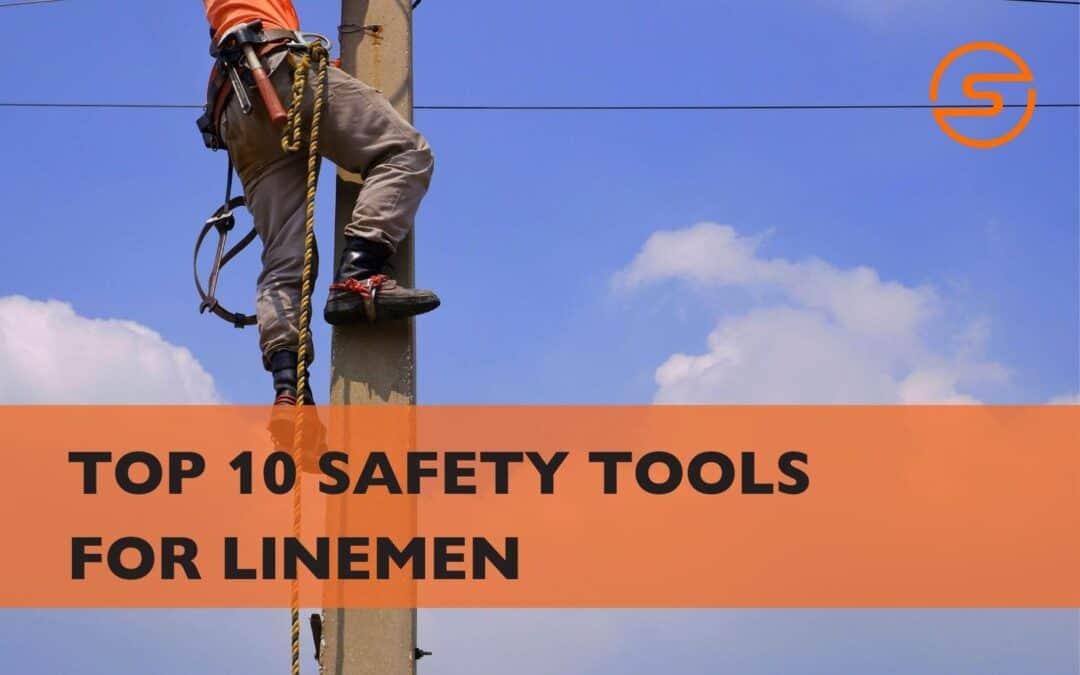Being a power company lineman is consistently rated as one of the top ten most dangerous jobs. Each year, between about 30 and 60 linemen are killed on the job, and thousands more are injured.
The high risk of injuries come from two features of a lineman’s job that are inherently dangerous: working with high voltage power lines and working at heights. Add to this the fact that linemen are often called out in extremely bad weather and at night to work on downed power lines, and it is not hard to see how a lineman’s job carries with it the constant risk of death or injury.
Given these risks, there is a constant focus by the industry and its suppliers on improving safety for lineman, both in terms of equipment and practices. At Safeguard, we’re doing everything we can to make lineman deaths and injuries a thing of the past. So what sorts of safety equipment do linemen need? Here is a list of what we consider the top ten tools linemen need for their safety.
-
Hardhats
There is no question that hardhats are critical. Hardhats not only protect the head from falling objects, but hardhats designed to reduce electrical shock are essential, particularly since linemen are often on poles that have multiple wires, transformers, and other equipment that is overhead while they work.
-
Face Shields and Safety Glasses
Linemen have to protect their faces and especially their eyes from the risk of arc flashes. Consequently, at a minimum, linemen need good safety glasses or, better yet, a full face shield that attaches to their hardhats when working on power lines.
-
Climbing Harnesses and Spikes
When a bucket truck is not available, linemen have to climb power poles with special harnesses, or belts, and climbing spikes (also called hooks, gaffs, or climbers). Using climbing gear is one of the key tasks that a lineman must master in order to get a job. Not only is this physically demanding, it is dangerous.
Good spikes need to be comfortable to climb in and stand on when working on power lines, as well as strong, stable, and secure. Climbing belts, which go around the pole and aid in climbing, need to resist slippage and be able to support and catch a lineman.
-
Fall Protection Gear
As noted above, one of the features of a lineman’s job is working at heights, sometimes as high as 120 feet. Accordingly, the risk of serious injury or death from falling is very real. So, whether it is a lanyard attached to a bucket truck or a full body harness and lifeline for pole climbers, linemen need fall protection.
-
Dielectric boots, gloves, and sleeves
To protect against electric shock, linemen wear rubber electrical-insulating gloves, and often full sleeves. These gloves are rated depending upon the voltage the lineman will be exposed to. In addition to rubber gloves, lineman need leather outer gloves to protect the inner gloves from tears and holes that might allow electricity to penetrate the inner glove. Linemen must also wear boots or overshoes that resist electrical shock, with safety toes and slip-resistant soles.
-
Flame and Arc Resistant Clothing
Whenever working around electric fields, particularly when working with metal tools or in wet weather, the danger of an arc flash is real. An arc flash occurs when an electric current leaves its intended path and arcs over to another conductor or to ground. An arc flash can produce extreme heat, intense light and sound. Despite their short duration, arc flashes can cause severe burns, blindness, hearing loss, and even death to anyone in close proximity to the explosion. Protective clothing that resists flame, melting, and is self-extinguishing can be life-saving.
-
Voltmeters, Multimeters, Hot Sticks
Linemen use various types of meters to measure AC or DC voltage, current, and resistance. The purpose of these meters is first to determine whether a circuit is energized, and second to know what they are dealing with. Knowing this information is critical when working around power lines.
-
Insulated Tools
Although linemen use insulated gloves, sleeves, and other gear, using rubber insulated tools is an additional and necessary safety precaution.
-
Grounding Cables
While linemen often work where power lines have been de-energized, there are still dangers from electricity. Stored electrical current, an adjacent circuit, equipment malfunctions, or accidental re-energization are all circumstances that could give a fatal electrical shock to a lineman. Consequently, linemen working on power lines need grounding kits to divert any electrical current from the cables they are working on to the ground.
-
Voltage and Current Detectors
Electricity cannot be seen, and contact with an electrical charge can be fatal. So how do you know when the danger is there? By using a voltage and current detector. Safeguard’s Compass voltage and current detector provides linemen with a personal, wearable “sixth sense” that indicates both visually and audibly when they are in proximity to an energized electrical field, with a full 360 degree range of detection for both voltage and electrical current, even for insulated wires. What is more, the Compass provides directional information, so that a lineman working in a difficult environment knows exactly where the threat lies.
Safeguard’s Compass line of voltage and current detectors represent the cutting edge of safety technology for today’s linemen. Call Safeguard Equipment today to find out more about how our products are saving lives.

